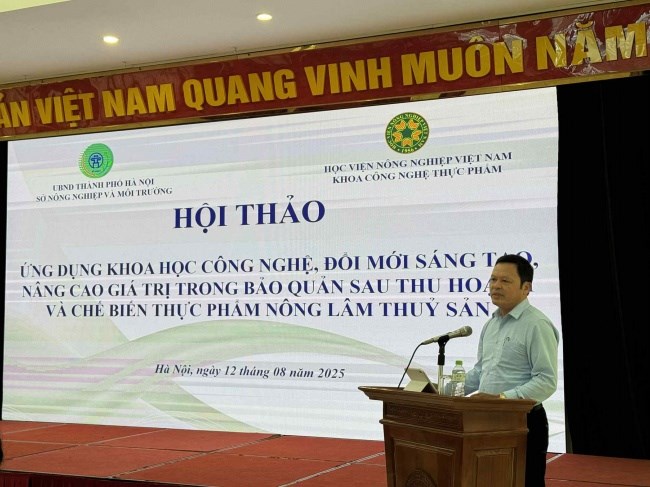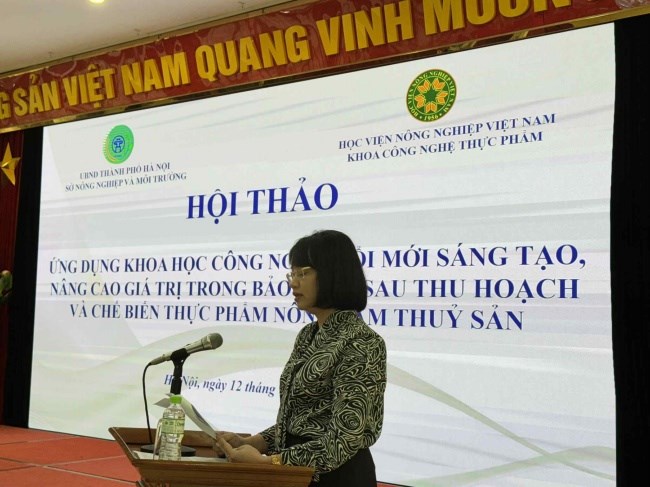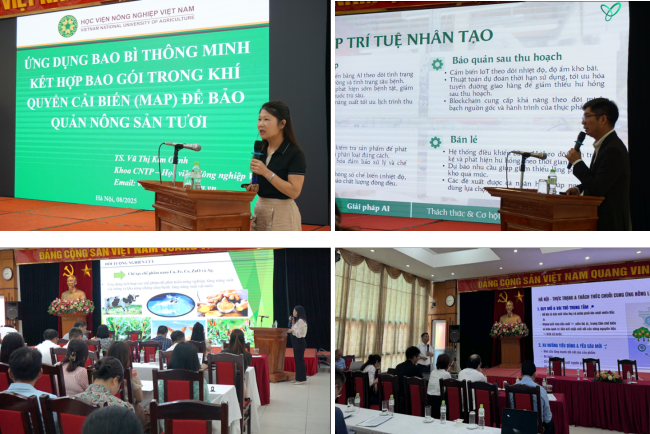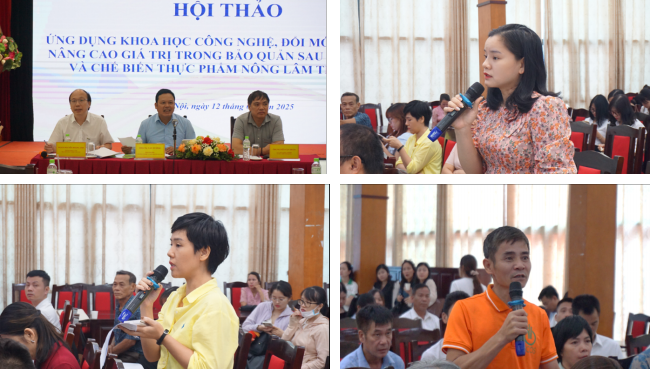On August 12, 2025, the Hanoi Department of Agriculture and Environment, in partnership with the Faculty of Food Science and Technology (Research Group on Microbiology and Food Safety) of Vietnam National University of Agriculture, held a workshop at the Guest House of the Central Party Office entitled “Application of science, technology, and innovation to enhance post-harvest preservation and processing of agricultural, forestry, and fishery products”. This event is part of the city’s strategic initiatives toward a modern, sustainable agricultural sector powered by science and technology.
In his opening remarks, Mr. Ta Van Tuong, Deputy Director of the Hanoi Department of Agriculture and Environment, emphasized the need to remove barriers, promote technology adoption, and improve the competitiveness of Hanoi’s agricultural products. The workshop provided a platform for scientists, businesses, and farmers to exchange ideas and develop coordinated and practical solutions.

Mr. Ta Van Tuong delivers the opening remarks
Presenting an overview of the sector, Mrs. Nguyen Thi Thu Hang, Head of the Department of Quality and Market Development, noted that Hanoi has 13,739 agricultural establishments, including over 1,700 processing facilities, of which 98.5% is small or medium-sized. As a result, most products are sold fresh, with low added value. Ready-to-eat processed goods make up only 20-25% of modern retail sales, and local processing meets just 20% of consumption demand. Key challenges include limited technological capacity, low mechanization and automation, high costs, and a shortage of large enterprises capable of scaling up production. Solutions proposed include technology upgrades, investment incentives, and improved access to land and capital.

Mrs. Nguyen Thi Thu Hang presenting the current status of agricultural, forestry, and fishery production and trade in Hanoi
In her introductory remarks, Assoc. Prof. Dr. Nguyen Thi Thanh Thuy, from the Research Group on Microorganisms and Food Safety, Vietnam National University of Agriculture, presented the role and models of innovation, highlighted exemplary cases of outstanding innovation, and outlined orientations and solutions to foster innovation in the preservation and processing of agricultural, forestry, and fishery products. Innovation is no longer merely a strategic option, but has become a vital condition for the sector, enabling the transition from a resource-based agriculture to a knowledge- and technology-driven agriculture.
The workshop featured several in-depth technical reports:
Dr. Vu Thi Kim Oanh (Vietnam National University of Agriculture) presented Modified Atmosphere Packaging (MAP) technology, an effective method for slowing respiration and inhibiting spoilage-causing microorganisms in products such as vegetables (leafy, fruit, root), edible mushrooms, pre-cut produce, fresh meat, and processed meat. She also showcased models applying MAP alone or in combination with sensor packaging, absorbents, and smart label indicators, illustrated with vivid practical examples.
Dr. Nguyen Huy Toan (Verysell Technologies UK ltd.) highlighted the transformative role of AI (Artificial intelligence) in modernizing the food supply chain. AI enables automated quality control, defect detection through computer vision with higher accuracy than manual inspection, and supports freshness prediction, supply chain optimization, and product transparency. He noted that the company is prepared to provide tailored AI solutions to facilities and businesses upon request.
Dr. Cong Hong Hanh from the Institute of Materials Science, Vietnam Academy of Science and Technology, presented the potential applications of nanotechnology using nano-metals (Cu, Fe, Co, Ag). Research across multiple subjects has demonstrated positive impacts on seed treatment and disease control in both crops and livestock. Nano-silver, in particular, exhibited strong antibacterial and antifungal properties in ginger plants and proved effective in eliminating harmful bacteria in shrimp farming environments.
MSc. Nguyen Manh Hieu (Vietnam Institute of Agricultural Engineering and Post Harvest Technology) presented innovations in preservation and processing technologies. Addressing the current challenges of Hanoi’s agricultural supply chain, he proposed solutions including smart cold storage systems, Modified Atmosphere Packaging (MAP), freeze-drying, and AI/Blockchain applications to optimize logistics and product management. His own successful applications of these technologies have contributed to expanding the global presence of Vietnamese agricultural products.

Speakers delivering their presentations
Following the presentations, an active and substantive discussion ensued, reflecting strong stakeholder engagement. Representatives from cooperatives, businesses, and farming communities openly shared practical challenges related to information gaps and weak linkages. Scientists and policymakers responded with targeted solutions and recommendations.

Discussion session
The session concluded with consensus on the need for a comprehensive innovation ecosystem, linking the State, researchers, enterprises, and producers to translate breakthrough ideas into practice, thereby enhancing the value and global competitiveness of Vietnamese agricultural products.

Participants from VNUA

Research Group on Microbiology and Food Safety
Faculty of Food Science and Technology, VNUA